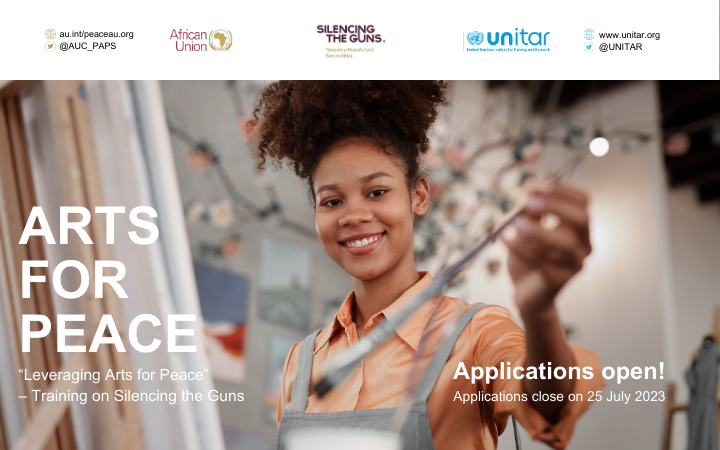I. Background
In conceptualizing the AU Master Roadmap of Practical Steps to Silence the Guns in Africa, the AU Peace and Security Council (PSC) recognizes the importance of involving civil society actors in the implementation of national actions to silence guns.
Thus, the AU Commission continues to create a conducive environment for the effective participation of civil society actors in the peace and governance processes at national, regional and continental levels; to enhance the critical role and contribution that they play in the promotion of democracy, good governance, sustainable peace, security and development.
To promote wider ownership of the AU Agenda of Silencing the Guns in the Continent and as a contribution to the theme of the Year 2021: "Arts, Culture and Heritage: Levers for Building Africa We Want", the Commission organized in Accra, Ghana, from 14 to 16 December 2021, a seminar under the theme: "Arts, Culture, and Heritage as Levers for Silencing the Guns in Africa". The Seminar, which involved young artists from the five regions of the Continent provided an opportunity to enhance the understanding of the AU peace and security mechanisms and efforts, as well as to build their capacities to promote the STG initiative in their respective countries and communities.
II. Introduction
As a follow-up to the December 2021 Accra Seminar, the Political Affairs, Peace and Security Department, (PAPS) through the Silencing the Guns (STGs) Unit, in collaboration with the United Nations Institute for Training and Research (UNITAR), will, from 14 to 18 August 2023, hold the first series of virtual trainings for African artists on 'leveraging Arts for Peace', guided by the outcomes of the Accra meeting; and grounded in the belief that Art helps prevent conflict in communities by raising awareness and inspiring tolerance around societal differences.
The training will cover topics on the role of artists in advancing peace advocacy through arts, introduction to silencing the guns, including AU's work in advancing peace and security, conflict prevention; and support to post-conflict reconstruction, as well as principles for effective advocacy and outreach, among others.
III. Objectives
The training is being held in the run-up to Africa Amnesty Month (which is observed each September) to mobilize African citizens to surrender illegally held small arms and light weapons to government authorities. It targets African artists from all the regions of Africa (North Africa, West Africa, Central Africa, East Africa, and Southern Africa). The training will sensitize the artists against the use of the art to incite violence, promote hate speech, hate crimes or other forms of conflict.
Specifically, the training aims to enable the artists to:
- Heighten public awareness and consciousness about silencing guns;
- Mobilize African citizens and other stakeholders to rally behind the silencing the guns continental campaign, to achieve a conflict-free Africa and create favourable conditions for the continent's socio-economic transformation;
- Heighten awareness of the proliferation of illicit Small Arms and Light Weapons, the negative impact such weapons have on the continent of Africa;
- Encourage African citizens in possession of illicit arms to surrender them to designated authorities in exchange for Amnesty.
IV. Criteria and Qualification
An African Artist with demonstrated commitment and significant contribution to the promotion of sustainable peace and security. Applications from established artists, including young women artists, displaced persons and persons with disabilities who meet the following selection criteria are particularly encouraged:
- Be a citizen of an AU member state
- Have at least secondary school qualifications
- Be an established artist;
- Have experience in promoting, advancing and supporting peace processes, especially, community engagement experience through art
- Have a strong track record with the local community/area where he/she works
- Be proficient in either French or English languages
- Preferably able to attend from a computer for the duration of the training
- Availability and willingness to take part in the online training (5 days and 2 and half hours of
training per day and 2 hours of homework daily).


